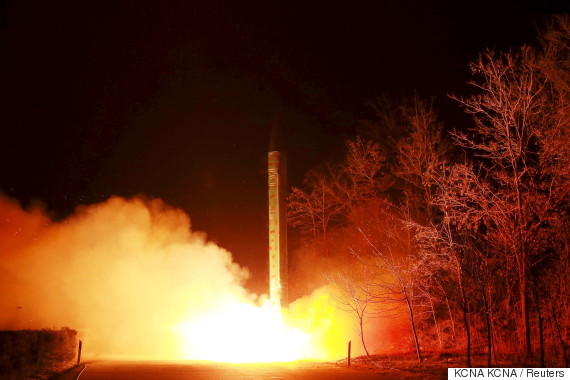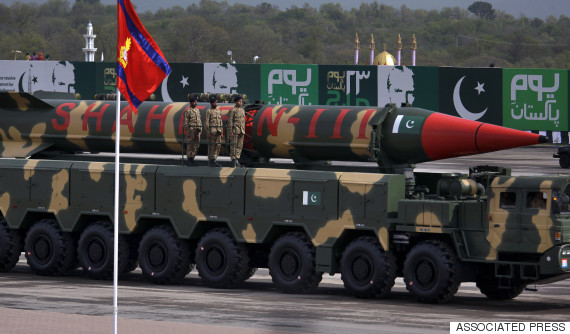
The good news is that world leaders are gathering again in Washington to announce new measures to stop terrorists from getting nuclear weapons. The bad news is that it may not be enough.
This is the fourth and final nuclear security summit, and it could not come at a better time. The Brussels attacks and news that the terrorists had secretly filmed a Belgian official who worked at a nuclear facility has sent chills down the spines of even the most hardened security experts. We may be closer to a nuclear terrorist attack than many realize. "The capabilities of some terrorist groups, particularly the Islamic State, have grown dramatically," said Harvard scholar and former Bush Administration official William Tobey. "In a net calculation, the risk of nuclear terrorism is higher than it was two years ago."
Since President Barack Obama began these innovative conferences in 2010, 12 nations have eliminated their stockpiles of highly enriched uranium, the fuel that powered the Hiroshima bomb. This includes Ukraine, where after 20 years of effort, officials shipped 440 pounds -- enough for a half dozen bombs -- out of the country just two years before mass protests toppled the government and civil war erupted. Scores of nations have committed to tightening security at their nuclear sites.
The bad news is that for all their success, these summits are not moving fast enough. When fleeing a forest fire, direction is important -- but so is speed. Can we get to safety before catastrophe engulfs us?
One accident is all it would take to trigger a global thermonuclear war.
When this summit ends, so will the process. There will be tons of nuclear material left poorly guarded in over 25 nations. It takes about 60 pounds of uranium to make a crude bomb. The worry is that we will be left with a patchwork of agreements, voluntary commitments and informal rules rather than legally binding obligations and the enforcement of global standards for guarding these deadly materials. Worse, the entire process has just focused on the nuclear material in civilian use, ignoring the vast majority of the material held by world militaries. If this weren't bad enough, the risk of nuclear terrorism is only one of the threats presented by nuclear weapons.
The agreement with Iran has stopped and rolled back its nuclear program. The risk of an Iranian bomb anytime in the next two decades is receding -- no matter what Donald Trump claims. But just when you thought it might be safe to get back in the water, the North Korean nuclear shark strikes with another nuclear test in January and a satellite launch last month. Just this week, it released a bizarre video showing Washington ablaze in a nuclear fire. North Korea is the last remaining proliferation threat, and if we don't stop it soon, the threat of a growing arsenal and unstable leadership could push neighboring nations to consider starting their own nuclear arsenals.

In South Asia, Pakistan and India are already in a nuclear arms race. Each has over 100 weapons and is building more. With unresolved border disputes and a history of conflict over the past few decades, the risk of a new conflict escalating into a regional nuclear war is high. The impact would be global. Tens or hundreds of millions would be killed, a subcontinent destroyed, the world economy shattered. Smoke from the fires ignited by the nuclear explosions, scientists estimate, could shroud the Earth in clouds, dropping global temperatures enough to kill many food crops and triggering a famine that could kill a billion people.
But the greatest dangers may come from our own arsenals. Russian President Vladimir Putin, reflecting the tension between Russia and the U.S., is not attending the security summit. Russia is a country in decline, but it maintains about 7,000 nuclear weapons. So does the U.S. Russia keeps about 900 of these weapons on hair-trigger alert, ready to launch in minutes. So does the U.S. There have been dozens of close calls in the nuclear age when these weapons were almost launched.
One accident -- one miscalculation -- is all it would take to trigger a global thermonuclear war. Most people believe that danger ended with the Cold War. They are wrong. The war is over, but the weapons remain.
Obama could use a speech at Hiroshima to recapture his agenda, to force executive actions.
It gets worse. We are on the brink of a new arms race. Russia is slowly building new nuclear weapons to replace its aging systems. But the Pentagon plan to spend $1 trillion to build a whole new generation of nuclear-armed submarines, missiles, bombers and warheads, dwarfs that efforts. Russia will struggle to keep up; China might conclude it must enlarge its small nuclear arsenal, triggering responses down the reaction chain to India, Pakistan and other nations.
Sadly, despite his many achievements, the legacy of a president who sought "the peace and security of a world without nuclear weapons" may be the extension of the nuclear age for another 50 years. "Nuclear weapons are up, up, up, and controlling them is down, down, down," warned Harvard professor Matthew Bunn.
President Obama still has time. He is said to be considering a visit to Hiroshima when he goes to Japan for the G7 summit later this year. He should go. The Atomic Bomb Dome there is a chilling reminder of what just one small nuclear weapon can do. The weapons in our arsenals are vastly more powerful than the blast that incinerated tens of thousands of men, women and children in a single blast.

The president has the right vision, but he has been let down by his own bureaucracy, particularly Pentagon officials who defend obsolete nuclear programs more than the president's policies. He could use a speech at Hiroshima to recapture his agenda, to force executive actions.
He could announce that he is canceling or delaying the most dangerous and destabilizing of the new systems he has ordered built -- the new nuclear cruise missile and the new intercontinental ballistic missile, as former Secretary of Defense Bill Perry urged. He could take at least a portion of our redundant, obsolete weapons off of hair-trigger alert. He could pull our nuclear weapons left over from Cold War deployments from insecure bases in Turkey and Belgium. He could take any of a dozen other actions experts have recommended.
He could leave the presidency knowing that when he had the chance, he did everything he could to protect America from the most horrific weapons humankind ever invented.
Also on WorldPost:

